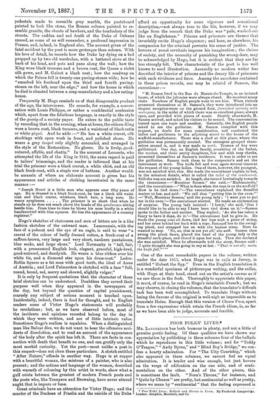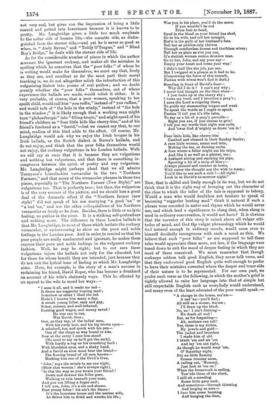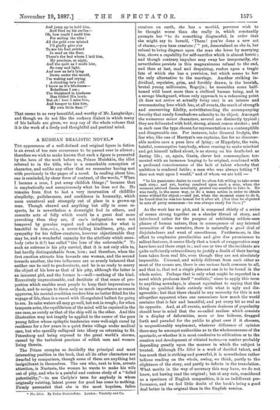POOR FOLKS' LIVES"
Ma. LAI:campus has both humour in plenty, and not a little of genuine poetic feeling. Of these qualities we have shown our appreciation by publishing in these columns four of the ballads which he reproduces in this little volume ; and for "Teddy O'Teague," "Andy Byrne," and " Blind Boy's Bridge," we con- fess a hearty admiration. For "The City Courtship," which also appeared in these columns, we cannot feel an equal admiration. It is tender and wise enough, but just hovers on the verge of edification on the one side, and of senti- mentalism on the other. And of the other pieces, this is sometimes the fault. "Horn's Throne," for instance, and " Quite by Chance" are pretty, but sentimental as well as pretty, where we mean by " sentimental " that the feeling expressed is • Poor Folks' Lives Ballasts and Stories in Verse. By Frederick Langbridge. London: Simpkin, Marshall, and Co.
not very real, but gives one the impression of being a little coaxed and petted into luxuriance because it is known to be pretty. Air. Langbridge gives a little too much emphasis to the softer side of human life,—the amiable side, as distin- guished from the sterner side,—and yet he is never so good ae when, in "Andy Byrne," and "Teddy O'Teague," and "Blind Boy's Bridge," he deals with the sterner side of life.
As for the considerable number of pieces in which the author assumes the ignorant cockney, and makes all the mistakes in spelling which he conceives that the " poor folks " of whom he is writing would make for themselves, we must say that, lively as they are, and excellent as for the most part their moral teaching is, we do not altogether relish the introduction of this vulgarising dialect into poems of real pathos ; and we doubt greatly whether the "poor folks" themselves, out of whose experience the ballads are made, would relish it either. It is very probable, of course, that a poor woman, speaking to her spoilt child, would call him "you raffia," instead of " you ruffian," and would talk of " the hole in the windy," instead of "the hole in the window ;" it is likely enough that a working man might turn "philanthropic" into "filling-tropic," and might speak of his friend's children as " four little kid, like cherry-bim," and of his friend's forehead as a " forrid,"—but we cannot say that, to our mind, realism of this kind adds to the effect. Of course, Mr. Langbridge would ask why we enjoy the Irish brogue in his Irish ballads, or the Scotch dialect in Barns's ballads, and do not enjoy, and think that the poor folks themselves would not enjoy, the cockney vulgarisms in hie London ballads. Well, we will say at once that it is because they are vulgarisms and nothing but vulgarisms, and that there is something in- congruous between the spirit of poetry and any vulgarism. Mr. Langbridge might perhaps plead that we all admire Tennyson's Lincolnshire vernacular in the two "Northern Farmers," and that many of the vernacular phrases in those two pieces, especially in " The Northern Farmer (New Style)," are vulgarisms too. That is perfectly true; but then, the vulgarism is of the very essence of the picture, and we should lose a great deal of the dramatic effect if the "Northern farmer (new style)" did not speak of his son marrying "a good 'on" or "a bad 'un," and use the other colloquialisms of his Northern vernacular as freely as he does. Besides, there is little or no lyric feeling, no pathos in the piece. It is a striking self-portraiture and nothing more. The difference in these London ballads is that Mr. Langbridge, in most of those which imitate the cockney vernacular, is endeavouring to show us the pure and noble feelings in the London poor. And in order to remind us that his poor people are really uneducated and ignorant, he makes them express their pure and noble feelings in the vulgarest cockney fashion. Well, he may be right; but to our ears these vulgarisms injure the ballads not only for the educated, but for those for whose benefit they are intended, just because they do not suit the lyrical tone of feeling at which Mr. Langbridge aims. Here, for example, is the story of a man's success in reclaiming his friend, David Roper, who has become a drunkard on account of his wife's slatternly ways. This he effected by an appeal to the wife to mend her ways:- " I aeon it all, and it made me sad—
It drove me reggerler busting mad ; Somehow or other I liked the lad.
Hadn't I known him many a day, A smart young feller, easy and gay, Sober, correct, and well-behaved, Earning good wages, and money saved ?
He was one in ten, Was David, then; One, as they say, of the ladies' men,
With his curly hair, and his big brown eyes— A echolard, too, and quick with his pen—
One of the chaps as was bound to rise.
Now at the entry I sees him stand (No need to say as he'd got the sack),
With hardly a rag on his crouching back ;
With bloodshot eyes, and a shaky hand,
And a fervid as soon must bear the brand— The flaming brand of all men known—
Marking him one of the Devil's Own.
' John,' says the missis to me one night, (Blow that woman ! she's always right), 'Is this the way as you treats your friend ?
Down and downer the feller goes, Walking to ruin beneath your nose, And you not lifting a finger-end; t tell you, Sohn, it's a sin and shame.
Poor young feller ! his ain't the blame !
It's the homeless bowie and the useless wife, As drives him to drink and wrecks his life ; Was you in his place, you'd do the same.
If you wouldn't be red From foot to head, Dyed in the blood as your friend has shed, Go to his wife, and tell her straight,
Her'n is the guilt of her husband's fate.
Tell her as publics only thriven
Through comfortless homes and thriftless wives; Tell her as plain as e'er you can, It's sluttish woman makes drunken man.
Go to her, John, and say your say—
Empty year heart and come your way.'
I didn't half like the job, you see, But I twigged at a glance as it had to be.
(Concerning the force of this remark, Parties with wives won't find it dark.)
Standing in front of David's door—
Why did I do it ? I can't say why; I never had thought on the likes afore--I just looks up at the starry sky ; I bows my head, and I breathes a pray'r ; I axes the Lord a•reigning there, To guide my stammering tongue and weak To speak the words as I ought to speak. Parties 'll tell you it's idle tales,
To say as a bit of a pray'r prevails—
Bight you are, if you choose to grin! I tell you my words that night was nails, And 'twos God A'mighty as drove 'em in !
. . . . . . . . . .
Four little kids, like cherry-bim Combed and cleaned in their Sunday frocks; A rare little woman, smart and trim, Making the tea, or darning socks.
A floor where a feller might eat his tripe, And like it as well as a platter, too; A husband sitting and smoking his pipe, Sporting a bit of a strip of blue;— Always pleased and content at home, With never the thought nor the wish to roam ; You'd like to see such a crib ?—All right ! Look in at David's to-morrow night."
Now, that is skilful and lively enough in its way, but we do not think that it is the right way of bringing out the character of the class to which the teller of the tale is supposed to belong. Would a man who would doubtless not hesitate to speak of becoming "reggerler busting mad" think it natural if such a phrase were recorded in metre and rhyme which he would never use, and which lend a significance to slang that, when slang is used in ordinary conversation, it would not have P It is obvious that the narrator of this story is raised above all vulgar atti- tudes of mind, and that the vulgar phraseology which he would find natural enough in ordinary moods, would seem even to himself decidedly incongruous with each a mood as this. We believe that such "poor folks" as aro supposed to tell these tales would appreciate them more, not less, if the language were toned down to snit the mood of deeper feeling in which they are most of them conceived. We must remember that though cockneys seldom talk good English, they never talk verse, and that they understand good English quite well enough to prefer to have their mistakes corrected where the deeper and truer aide of their nature is to be represented. For our own part, we prefer such verse as the following, in which the mother's grief is rightly allowed to raise her language into that of simple but still respectable English such as everybody would understand, and many even of the least educated of the poor would speak
:- "A change in the house, ma'am—
A sad 'nn—you'll find; All still as a mouse, ma'am ; I'll draw up the blind.
No, no ! I ain't fretting—
Hz doeth all well!
But, as for forgetting- Ah, mothers can tell!
Yea, these is my riches,
My jewels and gold—
The jacket and breeches I made him of old.
I brash 'em and air 'em And lay 'em out right,
As though he would wear 'em,
0' Saturday night, But no little Sammy Comes running anon, A•calling out,' Mammy, Just look at 'em on !'
When the housework is ending, Tow'rds three of the clock, I still sit a-mending Some little grey sock.
And sometimes—through thirsting And longing so Bere- t hear him come bursting And banging the door, And lamp op to hold him,
And feed on his smiles—
Oh, how could I scold him For soiling the tiles !
All the gold ever minted I'd gladly give o'er To see his foot printed In mud on the floor.
There's the bed where I laid him, My precious, at night, And the quilt as I made him, So cosy and light.
And now as he's lying Down under the mould, I'm waking and crying
A-thinking he's cold.
I know as it's blindness—
Rebellious I am The Shepherd in kindness Has folded His lamb.
But oh! how I mien him, And hanger to kiss him,
My own little Sam !"
That seems to us very beautiful, and worthy of Mr. Langbridge ; and though we do not like the cockney dialect in which many of his ballads are given, we may say of the whole volume that it is the work of a lively and thoughtful and poetical mind.

























































 Previous page
Previous page